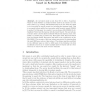102 search results - page 8 / 21 » Practical Identity-Based Encryption Without Random Oracles |
113
click to vote
ICCSA
2007
Springer
15 years 8 months ago
2007
Springer
An encrypted email is sent from Bob to Alice. A gateway wants to check whether a certain keyword exists in an email or not for some reason (e.g. routing). Nevertheless Alice does n...
127
Voted
EUROCRYPT
2006
Springer
15 years 6 months ago
2006
Springer
We present the first aggregate signature, the first multisignature, and the first verifiably encrypted signature provably secure without random oracles. Our constructions derive f...
110
click to vote
ATC
2007
Springer
15 years 8 months ago
2007
Springer
A proxy signature scheme allows an entity to delegate its signing capability to another entity (proxy) in such a way that the proxy can sign messages on behalf of the delegator. Pr...
141
click to vote
PROVSEC
2010
Springer
15 years 12 days ago
2010
Springer
Abstract. Signcryption as a single cryptographic primitive offers both confidentiality and authentication simultaneously. Generally in signcryption schemes, the message is hidden a...
132
click to vote
SCN
2008
Springer
15 years 2 months ago
2008
Springer
We present an implementation of the protocol of Lindell and Pinkas for secure two-party computation which is secure against malicious adversaries [13]. This is the first running sy...

